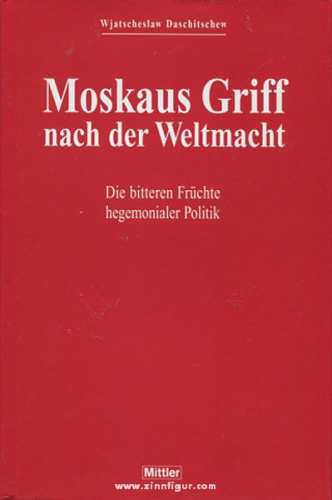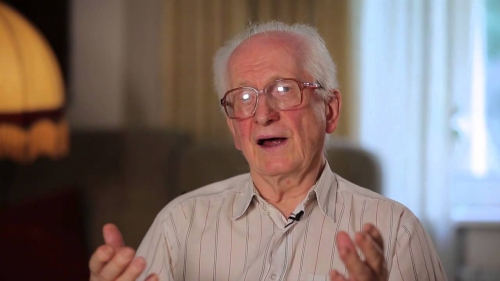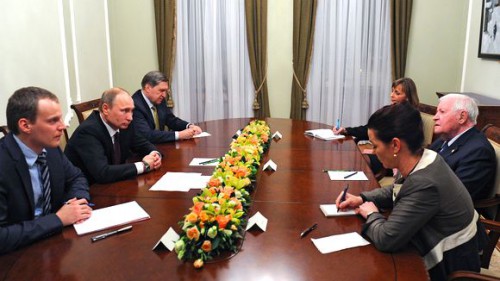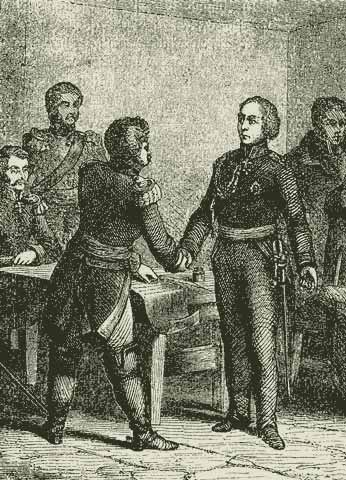Late last night, Vladimir Putin met with Helmut Schmidt, a German statesman and the fifth chancellor of the Federal Republic of Germany from 1974 to 1982.
PRESIDENT OF RUSSIA VLADIMIR PUTIN: Mr Chancellor, please allow me to warmly welcome you.
It is a great pleasure and honour for me to meet with you in Moscow, for you are not only the patriarch of European politics but of global politics as well.
You have done a great deal for the development of the Federal Republic and Europe, but you have also made significant contribution to the development of Russian-German relations. The decision on the “gas for pipe” contract was made while you were a member of the Government. In one of your articles I read that at that time, after the war, no hatred remained between the Germans and the Russians toward one another, and this was very good.
I want to tell you that we have made a great deal of progress in developing our relations. Today, Germany is one of our leading trade and economic partners. This year, I believe we will cross the threshold of $75 billion in trade. Some two thousand German companies are operating in Russia, there is a large volume of mutual investment, and all this is developing. We are carrying out large-scale joint projects, working not only at the ministerial level, but the regional level as well.
We are broadening contacts between civil societies and people, which is probably more important than anything.
I am very happy to see you. Welcome, Mr Chancellor.
HELMUT SCHMIDT (translated from Russian): Thank you very much, Mr President,
You have already mentioned that neither Russians nor Germans harbour any hatred toward one another. And that, indeed, is a surprise; having been a soldier in World War II, I simply cannot believe that we have reached such a positive result, which was simply impossible to dream about at the time.
Mr President, you have already said some beautiful words about me, but you must nevertheless know that I am almost 95 years old; I am a very old man who is hard of hearing and no longer needed. Today, I am only an observer; I am observing what is happening in the world. I can say that things have been worse on our planet, but we can still improve our current state of affairs. Nevertheless, today, I am no longer an active player in this arena; I am simply observing what is happening.
VLADIMIR PUTIN: Your birthday is on December 23, isn’t it?
HELMUT SCHMIDT: That’s right. I was almost a Christmas baby; Christmas is celebrated in Germany on the 24th.
You know, this is – how can I say – my farewell visit to Russia, because it has become very difficult for me to travel; I didn’t even really want to come here, because it truly is quite difficult for me. But ultimately, you must say your proper goodbyes to your neighbours, right? I have already visited China, the United States, Italy and France. But it was particularly important for me to come here, because I remember that at the end of the last century, in 1999, at the end of this century, at the end of the next century – we will always remain neighbours. In spite of any economic developments, or military developments, we will always be bound by fate; we will always remain neighbours. Granted, we have Poland and Ukraine between us, as well as other nations. But in good times and in bad times, we nevertheless remain neighbours forever – neighbours who depend on one another.
You know, about 40 years ago, the General Secretary [of the Central Committee of the CPSU] Leonid Brezhnev came to visit Germany – West Germany at the time – and met with then-Federal Chancellor Willy Brandt. This was in the 1970s and I was present at that meeting. And Brezhnev spoke for a very long time, listing the terrible actions we committed on Russian soil. I think he spoke for about 15 minutes. When he finished, I also made a long speech. I said, “Mr General Secretary, everything you just said is, of course, true. Everything is correct; we committed terrible acts on Russian soil. Yes, we started the war, all this was our fault, but if you say that all Germans were fascists, I must tell you that is not true. Yes, all this was our fault, but not all Germans were fascists. In most cases, these were simply German soldiers who felt that they must defend their Fatherland. Yes, all this happened, all this was simply awful, but it is nevertheless wrong to call all Germans fascists. These were simply soldiers who were misled to believe in the wrong values.”
I want to stress again: it truly is a miracle that there are nearly no feelings of hatred between our peoples today. And you very rightly mentioned that our relations are very good and tight, not only economically, but in many other areas as well. Indeed, we have become good neighbours, and I am one of the very many Germans who have always felt and continue to feel today that this is very important, to always have good neighbourly relations between our nations.
VLADIMIR PUTIN: Mr Federal Chancellor, you said that this is your farewell visit. But I hope we will still remain in contact. You will soon be celebrating your birthday, so please allow me to wish you a Happy Birthday.
We truly know how much you have done since Mr Willy Brandt passed the baton on to you. And your opinion regarding the future of Russian-German relations is very important for us and for future politicians.
Of course, there has been a great deal of tragedy in our relations. But you rightly stated – the interpreter left out a detail, but it is important – the detail is that we have always been together, in good times and bad. And it will be the same in the future. Still, we need to strive to avoid dark spots; on the contrary, we have everything we need to grow together, rather than fight one another. Today’s trends in global development are pushing us toward joining forces.
I am certain that there are more elements uniting us than problems, which might cause disputes, both on a day-to-day level and politically. I would very much like for the opinions of people such as you to be spread even wider within our Russian establishment, as well as in Europe.
HELMUT SCHMIDT: You know, I would very much like that too. Although I must say that at this time, Europe is undergoing a crisis and things are not at their best; Europe is going through an institutional crisis.
I must say that the parliament is not very capable, the commission in Brussels is not functioning so well, various councils of ministers are also not working well, and the actions taken by individual governments leave something to be desired. I think there have been two outstanding leaders in Europe since the war: Winston Churchill and Charles de Gaulle. Since then, the quality of European leaders is gradually going down.
VLADIMIR PUTIN: The Chancellor who preceded you, Willy Brandt, certainly belongs to this cohort, at the very least.
HELMUT SCHMIDT: I agree with you.
VLADIMIR PUTIN: If I may, I have already said that you firmly gripped the baton that was passed to you, and I think you also played a tremendous role, as did the other Federal Chancellor, Mr Helmut Kohl.
As for critical statements, you certainly have the right to make them. But I do not share your view. Still, you and I can discuss this matter further.
HELMUT SCHMIDT: But I haven’t criticised anything yet.
VLADIMIR PUTIN: So this was only a prelude.
HELMUT SCHMIDT: No, I just stated the facts.
VLADIMIR PUTIN: You see, the global economic situation is complicated. It’s true that it is difficult to resolve the problems Europe faces, given the European nations’ large social burden, which is due to their development model. But on the other hand, it is precisely these difficulties that should prompt us to work together.
 Er studierte nach dem Krieg an der Lomonossow-Universität. In 1973 promovierte er als Historiker. Sein beruflicher Weg führte ihn in die russische Akademie der Wissenschaften. Er war zur Zeit der Perestroika Professor der Diplomatischen Akademie des sowjetischen Außenministeriums und Berater von Michael Gorbatschow. Sein großes politisches Ziel war die Entspannung des Ost-West-Problems. Er befürwortete ganz intensiv das Zustandekommen der Wiedervereinigung Deutschlands. Er kämpfte für die Einhaltung der Menschenrechte, befürwortete die Grundsätze einer Demokratie und der Sozialen Marktwirtschaft.
Er studierte nach dem Krieg an der Lomonossow-Universität. In 1973 promovierte er als Historiker. Sein beruflicher Weg führte ihn in die russische Akademie der Wissenschaften. Er war zur Zeit der Perestroika Professor der Diplomatischen Akademie des sowjetischen Außenministeriums und Berater von Michael Gorbatschow. Sein großes politisches Ziel war die Entspannung des Ost-West-Problems. Er befürwortete ganz intensiv das Zustandekommen der Wiedervereinigung Deutschlands. Er kämpfte für die Einhaltung der Menschenrechte, befürwortete die Grundsätze einer Demokratie und der Sozialen Marktwirtschaft.




 del.icio.us
del.icio.us
 Digg
Digg
 Zahlreiche russische Staatsmänner haben die Auffassung vertreten, gute Beziehungen mit dem deutschen Volk seien das A und O der russischen Europapolitik. Die deutschen Patrioten pflichten dieser Ansicht voll und ganz bei und halten ein deutsch-russisches Bündnis für den Eckstein der deutschen Ostpolitik. Als Vorbild dient ihnen Tauroggen. Am 30. Dezember 1812 unterzeichneten der preußische General York von Wartenberg und der russische General Dibitsch in einer Mühle des litauischen Dorfes Poscherun die Konvention von Tauroggen. Diese sollte das Schicksal Napoleons endgültig besiegeln und seine Niederlage unvermeidlich machen.
Zahlreiche russische Staatsmänner haben die Auffassung vertreten, gute Beziehungen mit dem deutschen Volk seien das A und O der russischen Europapolitik. Die deutschen Patrioten pflichten dieser Ansicht voll und ganz bei und halten ein deutsch-russisches Bündnis für den Eckstein der deutschen Ostpolitik. Als Vorbild dient ihnen Tauroggen. Am 30. Dezember 1812 unterzeichneten der preußische General York von Wartenberg und der russische General Dibitsch in einer Mühle des litauischen Dorfes Poscherun die Konvention von Tauroggen. Diese sollte das Schicksal Napoleons endgültig besiegeln und seine Niederlage unvermeidlich machen.